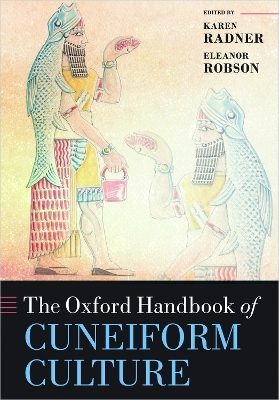
The Oxford Handbook of Cuneiform Culture
Oxford University Press (Verlag)
978-0-19-885603-0 (ISBN)
The cuneiform script, the writing system of ancient Mesopotamia, was witness to one of the world's oldest literate cultures. For over three millennia, it was the vehicle of communication from (at its greatest extent) Iran to the Mediterranean, Anatolia to Egypt. The Oxford Handbook of Cuneiform Culture examines the Ancient Middle East through the lens of cuneiform writing. The contributors, a mix of scholars from across the disciplines, explore, define, and to some extent look beyond the boundaries of the written word, using Mesopotamia's clay tablets and stone inscriptions not just as 'texts' but also as material artefacts that offer much additional information about their creators, readers, users and owners.
Karen Radner (PhD Vienna 1997, Habilation Munich 2004) is the Alexander von Humboldt Professor for Ancient History of the Near and Middle East at LMU Munich. Her main research interests are in Assyria, especially the period from the 9th to the 7th centuries BC, on whose political, social, economic, legal, and religious history she has published extensively. Her books include editions of Middle and Neo-Assyrian archives and a study on how awareness of man's mortality shaped Mesopotamian culture (Die Macht des Namens: altorientalische Strategien zur Selbsterhaltung, 2005). She directs an AHRC-funded research project on the correspondence between the Assyrian kings and their magnates in the 8th century BC (http://www.ucl.ac.uk/sargon). Eleanor Robson is Professor of Ancient Middle Eastern History at University College London. Her research focuses on the socio-political contexts of intellectual activity in ancient Mesopotamia and the online edition of cuneiform texts. She is the author of Mathematics in Ancient Iraq: A Social History (2008) and director of the AHRC-funded research project, The Geography of Knowledge in Assyria and Babylonia, 700-200 BC (http://oracc.org/gkab).
I. Materiality and literacies
1: Jonathan Taylor: Tablets as artefacts, scribes as artisans
2: Robert K. Englund: Accounting in proto-cuneiform
3: Grégory Chambon: Numeracy and metrology
4: Niek Veldhuis: Levels of literacy
5: Brigitte Lion: Literacy and gender
II. Individuals and communities
6: Benjamin R. Foster: The person in Mesopotamian thought
7: Frans van Koppen: The scribe of the Flood Story and his circle
8: Hagan Brunke: Feasts for the living, the dead, and the gods
9: Michael Jursa: Cuneiform writing in Neo-Babylonian temple communities
10: Eva von Dassow: Freedom in ancient Near Eastern societies
III. Experts and novices
11: Yoram Cohen & Sivan Kedar: Teacher-student relationships: two case studies
12: Dominique Charpin: Patron and client: Zimri-Lim and Asqudum the diviner
13: Michel Tanret: Learned, rich, famous and unhappy: Ur-Utu of Sippar
14: Nele Ziegler: Music, the work of professionals
15: Silvie Zamazalová: The education of Neo-Assyrian princes
IV. Decisions
16: Sophie Démare-Lafont: Judicial decision-making: judges and arbitrators
17: Karen Radner: Royal decision-making: kings, magnates and scholars
18: Andreas Fuchs: Assyria at war: strategy and conduct
19: Anne Löhnert: Manipulating the gods: lamenting in context
20: Daniel Schwemer: Magic rituals: conceptualisation and performance
V. Interpretations
21: Ulla Susanne Koch: Sheep and sky: systems of divinatory interpretation
22: John M. Steele: Making sense of time: observational and theoretical calendars
23: Fabienne Huber Vulliet: Letters as correspondence, letters as literature
24: Eckart Frahm: Keeping company with men of learning: the king as scholar
25: Heather D. Baker: From street altar to palace: reading the built environment of urban Babylonia
VI. Making knowledge
26: Eleanor Robson: The production and dissemination of scholarly knowledge
27: Steve Tinney: Tablets of schools and scholars: a portrait of the Old Babylonian corpus
28: Mark Weeden: Adapting to new contexts: cuneiform in Anatolia
29: Francesca Rochberg: Observing and describing the world through divination and astronomy
30: Geert De Breucker: Berossos between tradition and innovation
VII. Shaping tradition
31: Frans Wiggermann: Agriculture as civilization: sages, farmers, and barbarians
32: Barbara Böck: Sourcing, organising, and administering medicinal ingredients
33: Nicole Brisch: Changing images of kingship in Sumerian literature
34: Caroline Waerzeggers: The pious king: royal patronage of temples
35: Philippe Clancier: Cuneiform culture's last guardians: the old urban notability of Hellenistic Uruk
| Erscheinungsdatum | 03.01.2020 |
|---|---|
| Reihe/Serie | Oxford Handbooks |
| Verlagsort | Oxford |
| Sprache | englisch |
| Maße | 173 x 247 mm |
| Gewicht | 1588 g |
| Themenwelt | Geschichte ► Allgemeine Geschichte ► Vor- und Frühgeschichte |
| Geschichte ► Allgemeine Geschichte ► Altertum / Antike | |
| Geschichte ► Hilfswissenschaften ► Paläografie | |
| Geisteswissenschaften ► Geschichte ► Regional- / Ländergeschichte | |
| Geisteswissenschaften ► Sprach- / Literaturwissenschaft ► Sprachwissenschaft | |
| ISBN-10 | 0-19-885603-2 / 0198856032 |
| ISBN-13 | 978-0-19-885603-0 / 9780198856030 |
| Zustand | Neuware |
| Haben Sie eine Frage zum Produkt? |
aus dem Bereich


